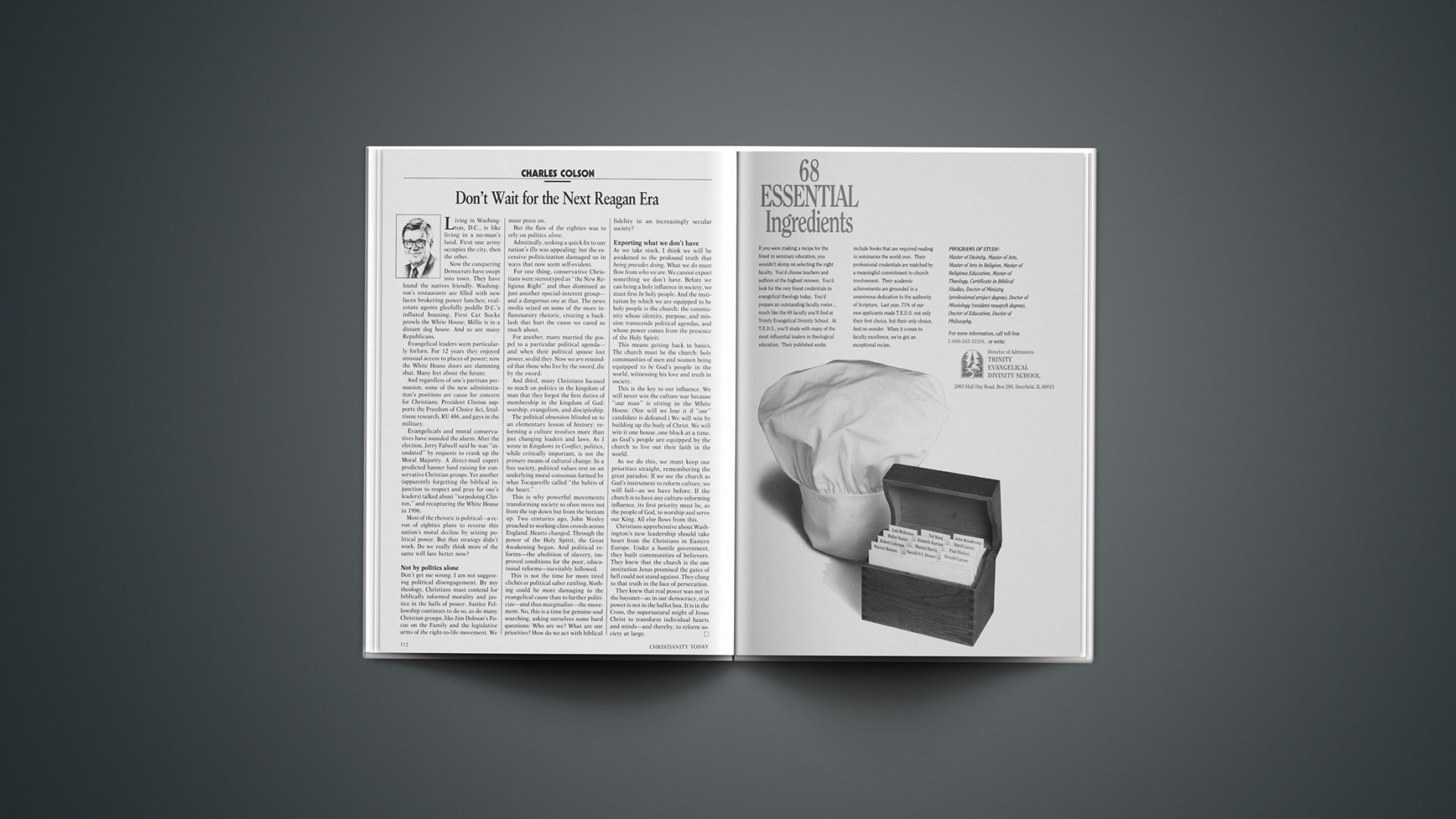Living in Washington, D.C., is like living in a no-man’s land. First one army occupies the city, then the other.
Now the conquering Democrats have swept into town. They have found the natives friendly. Washington’s restaurants are filled with new faces brokering power lunches; real-estate agents gleefully peddle D.C.’s inflated housing. First Cat Socks prowls the White House; Millie is in a distant dog house. And so are many Republicans.
Evangelical leaders seem particularly forlorn. For 12 years they enjoyed unusual access to places of power; now the White House doors are slamming shut. Many fret about the future.
And regardless of one’s partisan persuasion, some of the new administration’s positions are cause for concern for Christians. President Clinton supports the Freedom of Choice Act, fetal-tissue research, RU 486, and gays in the military.
Evangelicals and moral conservatives have sounded the alarm. After the election, Jerry Falwell said he was “inundated” by requests to crank up the Moral Majority. A direct-mail expert predicted banner fund raising for conservative Christian groups. Yet another (apparently forgetting the biblical injunction to respect and pray for one’s leaders) talked about “torpedoing Clinton,” and recapturing the White House in 1996.
Most of the rhetoric is political—a rerun of eighties plans to reverse this nation’s moral decline by seizing political power. But that strategy didn’t work. Do we really think more of the same will fare better now?
Not by politics alone
Don’t get me wrong. I am not suggesting political disengagement. By my theology, Christians must contend for biblically informed morality and justice in the halls of power. Justice Fellowship continues to do so, as do many Christian groups, like Jim Dobson’s Focus on the Family and the legislative arms of the right-to-life movement. We must press on.
But the flaw of the eighties was to rely on politics alone.
Admittedly, seeking a quick fix to our nation’s ills was appealing; but the excessive politicization damaged us in ways that now seem self-evident.
For one thing, conservative Christians were stereotyped as “the New Religious Right” and thus dismissed as just another special-interest group—and a dangerous one at that. The news media seized on some of the more inflammatory rhetoric, creating a backlash that hurt the cause we cared so much about.
For another, many married the gospel to a particular political agenda—and when their political spouse lost power, so did they. Now we are reminded that those who live by the sword, die by the sword.
And third, many Christians focused so much on politics in the kingdom of man that they forgot the first duties of membership in the kingdom of God: worship, evangelism, and discipleship.
The political obsession blinded us to an elementary lesson of history: reforming a culture involves more than just changing leaders and laws. As I wrote in Kingdoms in Conflict, politics, while critically important, is not the primary means of cultural change. In a free society, political values rest on an underlying moral consensus formed by what Tocqueville called “the habits of the heart.”
This is why powerful movements transforming society so often move not from the top down but from the bottom up. Two centuries ago, John Wesley preached to working-class crowds across England. Hearts changed. Through the power of the Holy Spirit, the Great Awakening began. And political reforms—the abolition of slavery, improved conditions for the poor, educational reforms—inevitably followed.
This is not the time for more tired clichés or political saber rattling. Nothing could be more damaging to the evangelical cause than to further politicize—and thus marginalize—the movement. No, this is a time for genuine soul searching, asking ourselves some hard questions: Who are we? What are our priorities? How do we act with biblical fidelity in an increasingly secular society?
Exporting what we don’t have
As we take stock, I think we will be awakened to the profound truth that being precedes doing. What we do must flow from who we are. We cannot export something we don’t have. Before we can bring a holy influence in society, we must first be holy people. And the institution by which we are equipped to be holy people is the church: the community whose identity, purpose, and mission transcends political agendas, and whose power comes from the presence of the Holy Spirit.
This means getting back to basics. The church must be the church: holy communities of men and women being equipped to be God’s people in the world, witnessing his love and truth in society.
This is the key to our influence. We will never win the culture war because “our man” is sitting in the White House. (Nor will we lose it if “our” candidate is defeated.) We will win by building up the body of Christ. We will win it one house, one block at a time, as God’s people are equipped by the church to live out their faith in the world.
As we do this, we must keep our priorities straight, remembering the great paradox: If we see the church as God’s instrument to reform culture, we will fail—as we have before. If the church is to have any culture-reforming influence, its first priority must be, as the people of God, to worship and serve our King. All else flows from this.
Christians apprehensive about Washington’s new leadership should take heart from the Christians in Eastern Europe. Under a hostile government, they built communities of believers. They knew that the church is the one institution Jesus promised the gates of hell could not stand against. They clung to that truth in the face of persecution.
They knew that real power was not in the bayonet—as in our democracy, real power is not in the ballot box. It is in the Cross, the supernatural might of Jesus Christ to transform individual hearts and minds—and thereby, to reform society at large.










